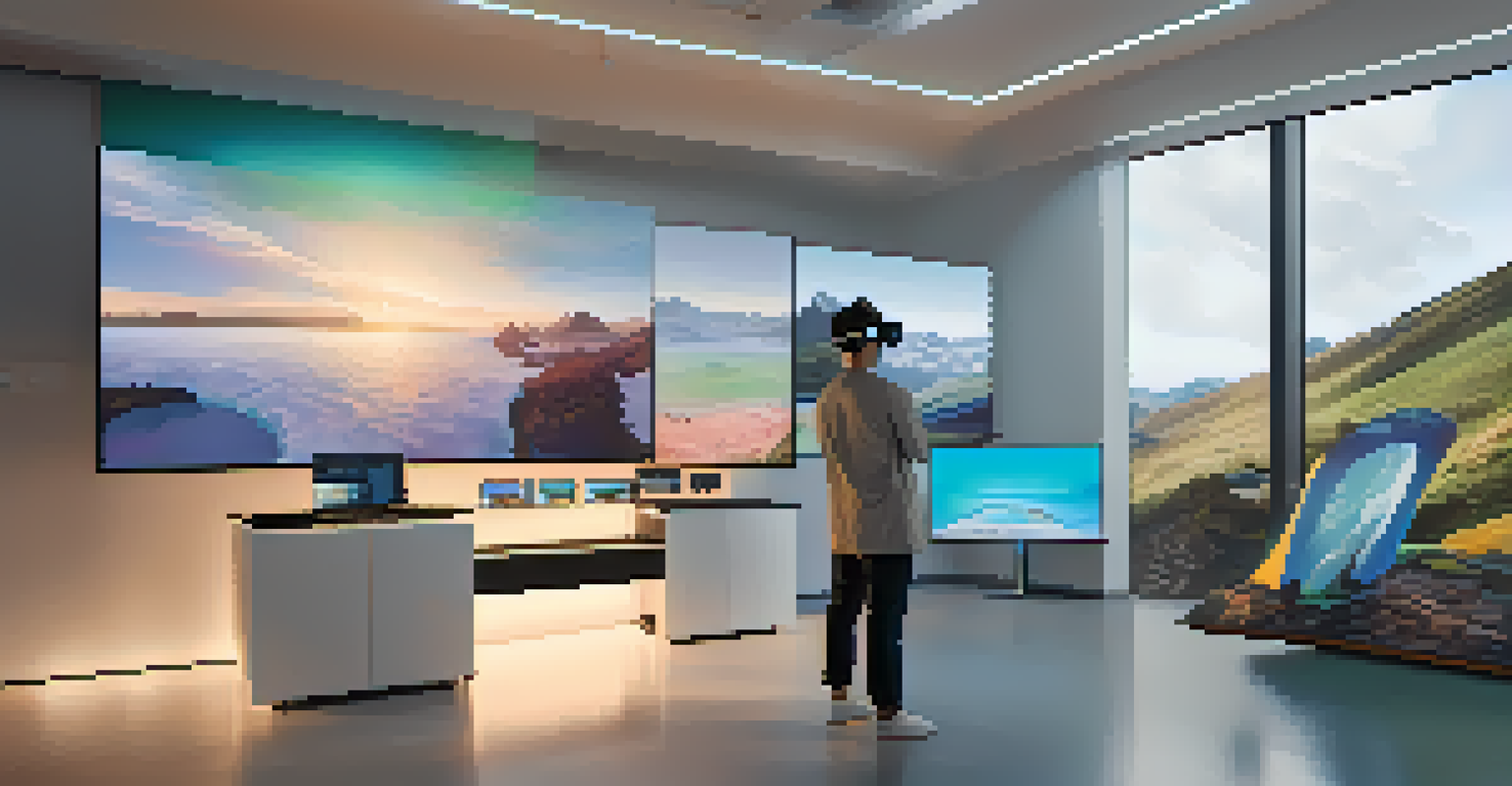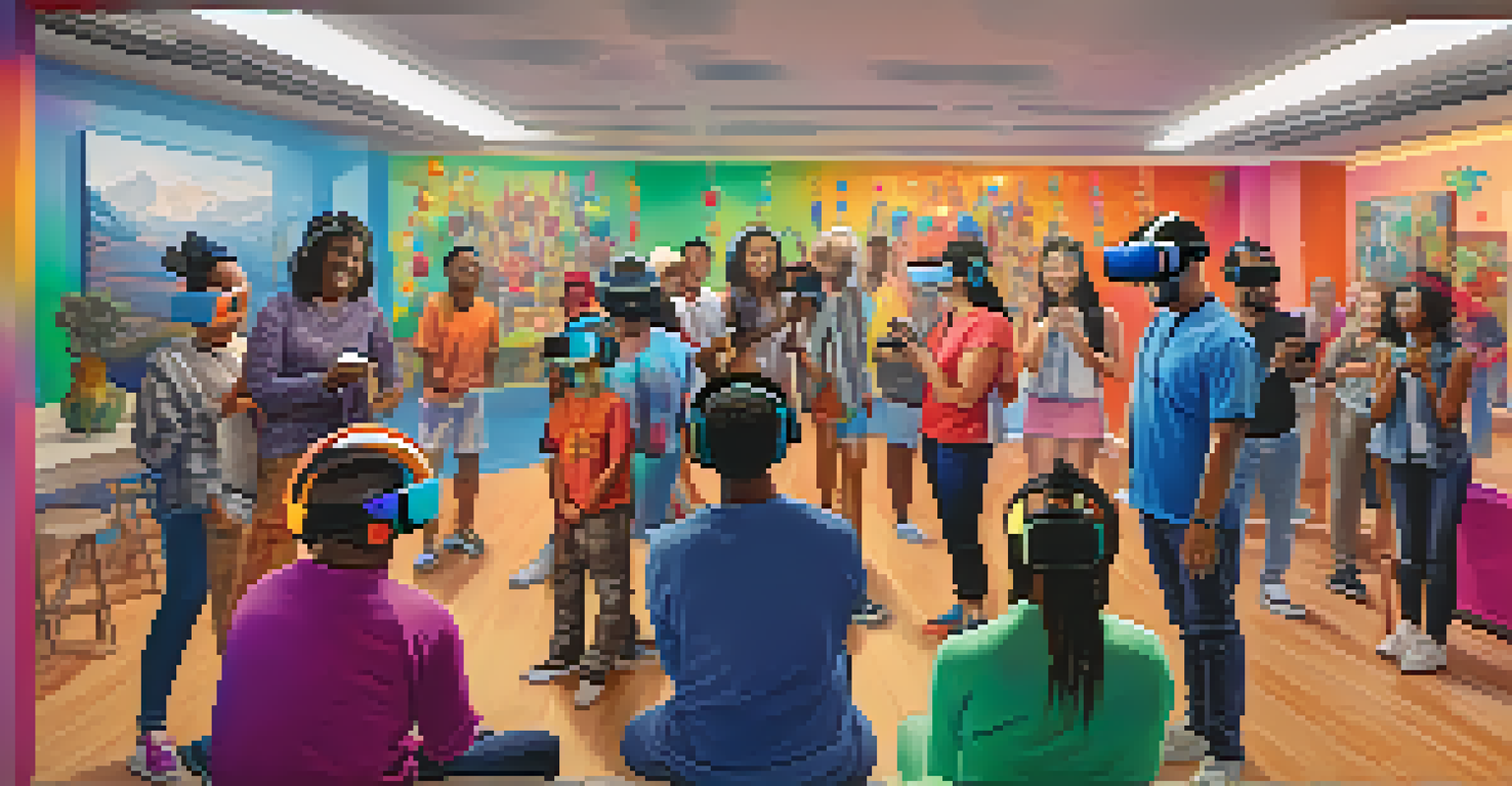Ethics of Using Virtual Reality for Behavioral Assessments

Understanding Virtual Reality in Behavioral Assessments
Virtual reality (VR) has emerged as a powerful tool for behavioral assessments, providing an immersive environment that can simulate real-world situations. This technology allows researchers and clinicians to observe and measure behaviors in ways that traditional methods cannot. For instance, a VR scenario could recreate a stressful social interaction to assess how an individual copes with anxiety in a controlled setting.
Informed consent is the cornerstone of ethical research, ensuring that participants understand the implications of their involvement.
However, while the advantages of using VR are clear, it also raises significant ethical concerns. The immersive nature of VR can potentially alter a participant's perception of reality, leading to questions about informed consent and the participant's ability to fully understand the experience they are engaging in. This is particularly relevant when working with vulnerable populations, such as children or individuals with mental health issues.
To navigate these complexities, it's crucial for practitioners to prioritize ethical guidelines and ensure that participants are fully informed about the VR experience. This includes discussing potential risks and benefits, as well as providing opportunities for participants to withdraw if they feel uncomfortable. By fostering an environment of transparency, we can better safeguard the integrity of behavioral assessments conducted in virtual reality.
Informed Consent: A Pillar of Ethical VR Use
Informed consent is foundational to ethical research, and it becomes even more critical when dealing with VR technologies. Participants should not only consent to partake in a study but also understand the unique aspects of VR, including its sensory and psychological impacts. This goes beyond simply signing a form; it involves ensuring that participants genuinely grasp what they are agreeing to.

For instance, a study involving exposure therapy for phobias might use VR to simulate heights. Researchers must explain how the technology works and what participants can expect during the session. This clarity helps build trust and empowers participants to make informed decisions about their involvement.
Ethics Must Guide VR Assessments
Practitioners need to prioritize ethical guidelines, including informed consent and participant well-being, to ensure integrity in VR behavioral assessments.
Moreover, researchers should provide participants with the option to ask questions and express any concerns they may have prior to the experience. By emphasizing informed consent, we not only comply with ethical standards but also enhance the overall quality and validity of the behavioral assessment.
Privacy and Data Security in VR Assessments
As with any digital platform, privacy and data security are paramount in VR behavioral assessments. Participants may share sensitive personal information, and the immersive nature of VR can lead to the collection of extensive data about their behaviors and reactions. This raises the question: how is this data being stored and protected?
The use of technology in behavioral assessments must prioritize the well-being and rights of participants above all else.
Researchers must implement robust security measures to safeguard participants' information from unauthorized access. This includes using encryption, secure storage solutions, and limited access to data. Additionally, participants should be informed about how their data will be used, stored, and potentially shared, ensuring transparency in the process.
By prioritizing privacy and data security, researchers can help alleviate concerns surrounding participation in VR studies. When participants feel confident that their information is safe, they are more likely to engage fully in the assessment, ultimately leading to more reliable results.
Potential Psychological Impacts of VR Experiences
While VR can offer valuable insights into behaviors, it’s essential to consider its psychological effects on participants. The immersive experience can evoke strong emotions, and individuals may react differently to virtual scenarios compared to real-life situations. This unpredictability can lead to unintended consequences, such as increased anxiety or distress.
For example, a participant undergoing a VR simulation designed to expose them to their fears may find the experience overwhelming, leading to heightened anxiety rather than therapeutic benefits. Researchers must be prepared to monitor participants closely and provide support throughout the assessment.
Privacy is Crucial in VR Studies
Robust security measures are essential to protect participants' sensitive information and foster trust in VR behavioral assessments.
To mitigate these risks, it’s important to conduct thorough pre-assessment screenings to identify any potential vulnerabilities. Establishing a debriefing process post-assessment also allows participants to discuss their experiences, helping them process any emotions that arose during the VR session.
Equity in Access to Virtual Reality Assessments
Another ethical concern in using VR for behavioral assessments is the issue of equity and access. Not everyone has the same level of access to VR technology, which can create disparities in who benefits from these innovative assessments. This raises questions about fairness and inclusivity in research practices.
For instance, individuals from lower socioeconomic backgrounds may not have the resources or opportunities to engage with VR, potentially skewing research findings and limiting the generalizability of results. Researchers must be mindful of these disparities and consider ways to make VR assessments more accessible to diverse populations.
One approach could involve partnering with community organizations to provide VR experiences in a controlled, supportive environment. By actively working to ensure equitable access, researchers can help foster inclusivity and enhance the overall validity of behavioral assessments conducted in virtual reality.
Combating Misuse of VR Technology in Assessments
As with any powerful tool, there is a risk of misuse when it comes to VR technology in behavioral assessments. This could include manipulating participants’ experiences in ways that could lead to harmful outcomes or misinterpretations of their behaviors. It’s crucial for researchers to establish guidelines that discourage unethical practices.
For example, a researcher might be tempted to use VR to create overly distressing scenarios in an effort to elicit strong reactions. However, this approach can compromise the ethical integrity of the study and harm participants. Researchers should always prioritize the well-being of participants over the pursuit of data.
Ensure Equitable Access to VR
Addressing disparities in access to VR technology is vital to promote fairness and inclusivity in behavioral research.
To combat misuse, institutions should implement clear ethical guidelines and provide training for researchers on responsible VR usage. By fostering a culture of ethical practice, we can ensure that VR technology serves as a beneficial tool in behavioral assessments, rather than a means of exploitation.
Future Considerations for Ethical VR Assessments
As virtual reality continues to evolve, so too must our approach to ethical considerations in behavioral assessments. It’s essential to stay informed about new developments in technology and research practices that could impact ethical standards. This includes ongoing discussions about the implications of more advanced VR systems and their potential effects on participants.
Moreover, involving a diverse group of stakeholders in discussions about ethical VR use can provide valuable insights into the multifaceted nature of these issues. By engaging ethicists, technologists, and representatives from various communities, we can develop comprehensive frameworks that address the ethical challenges posed by VR.

Ultimately, the goal is to harness the power of virtual reality in a way that respects participants' rights and well-being. By being proactive and vigilant, we can ensure that the benefits of VR in behavioral assessments are realized without compromising ethical standards.